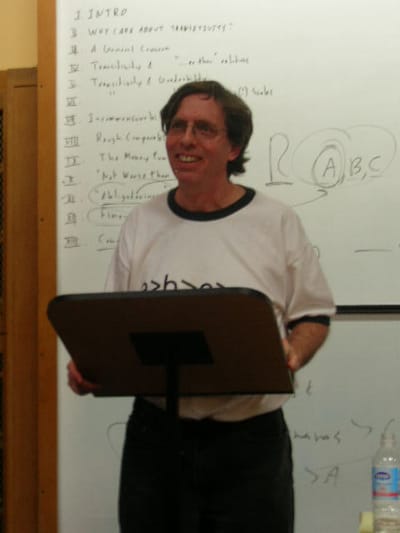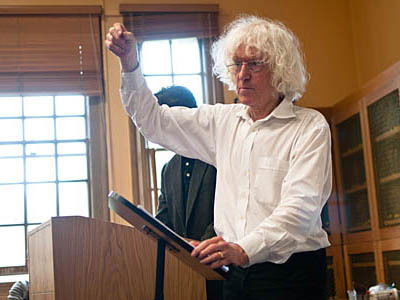Prioritarianism
A Students' Reflection
Larry Temkin

Larry Temkin is an American philosopher specializing in normative ethics and political philosophy. His research into equality, practical reason, and the nature of the good has been very influential. His work on the intransitivity of the "all things considered better than"-relation is ground breaking and challenges deeply held assumptions about value, practical reasoning, and the goodness of outcomes. His 1993 book "Inequality" was described by the Times Literary Supplement as "brilliant and fascinating," and as offering the reader more than any other book on the same subject.
Biography
Temkin graduated number one with a BA-Honors Degree from the University of Wisconsin–Madison in 1975, and received his Ph.D. in philosophy from Princeton University in 1983 under the supervision of Derek Parfit. He also studied at Oxford University in 1978-79. He began his professional career at Rice University, moving to Rutgers University in 2000. He has held Visiting Fellowships at the Australian National University, the National Institutes of Health, All Souls College (Oxford University), Harvard University’s Edmond J. Safra Center for Ethics, and the National Humanities Center.
Temkin is a committed teacher who has won eight major teaching awards. In 2011-2012, and is the Laurance S. Rockefeller Professor of Distinguished Teaching at Princeton University in the University Center for Human Values. Temkin is currently the chair of the Rutgers University philosophy department.
Derek Parfit

Biography
Parfit was born in 1942 in Chengdu, China, the son of Jessie (née Browne) and Norman Parfit, medical doctors who had moved to Western China to teach preventive medicine in missionary hospitals. The family returned to the United Kingdom about a year after Parfit was born, settling in Oxford. Parfit was educated at Eton College. From an early age, he endeavoured to become a poet, but he gave up poetry towards the end of his adolescence. He later studied Modern History at Balliol College, Oxford, graduating in 1964. In 1965–66 he was a Harkness Fellow at Columbia University and Harvard University. He abandoned historical studies for philosophy during the fellowship, returning to Oxford to become a fellow of All Souls College.
Parfit rose to prominence in 1971 with the publication of his first paper, "Personal Identity". His first book, Reasons and Persons (1984), has been described as the most significant work of moral philosophy since the 1800s. His second book, On What Matters (2011), was widely circulated and discussed for many years before its publication.For his entire academic career, Parfit worked at Oxford University, where he was an Emeritus Senior Research Fellow at All Souls College at the time of his death. He was also a visiting professor of philosophy at Harvard University, New York University, and Rutgers University. He was awarded the 2014 Rolf Schock Prize "for his groundbreaking contributions concerning personal identity, regard for future generations, and analysis of the structure of moral theories."
Parfit supported effective altruism. He was a member of Giving What We Can and pledged to donate at least 10% of his income to effective charities. Parfit was an avid photographer who regularly travelled to Venice and St. Petersburg to photograph architecture.
Parfit met Janet Radcliffe Richards in 1982. They married in 2010.
The Theory

Prioritarianism Explained
It is a view within ethics and political philosophy that holds that the goodness of an outcome is a function of overall well-being across all individuals with extra weight given to worse-off individuals. It is a noteworthy moral view that ranks outcomes according to the sum of a strictly increasing and strictly concave transformation of well-being numbers. It is a theory of the overall good that captures the common intuition of “priority to the worse off”. According to Holtug, Prioritarianism expresses giving ‘priority to the worse off in the distribution of advantages’ (Holtug N . Prioritarianism. Oxford research Encyclopaedia of politics. Oxford University Press: Oxford, 2017.Google Scholar). Therefore it can be said that Prioritarianism is a view of assemblage that is supposed to accommodate the widespread perception of the importance of distribution to those who are in the worst position within a group, community, or society. Prioritarianism should not be confused with utilitarianism because the two are completely different. Prioritarianism is about the distribution rules, which could be potentially shared across diverse approaches. This is distinct from utilitarianism, which asserts that any act or intervention should achieve ‘the greatest good for the greatest number of people’ (Mill JS , In Crisp R , eds. Utilitarianism. Oxford University Press: Oxford, 1998.Google Scholar), whereas prioritarianism differs in that it does not weigh the well-being of all individuals equally, but instead prioritizes those individuals that are worse-off.
Prioritarianism is welfarist in nature. It is perceived as such because of the main underpinning principle which is that the well-being of those in a group, community, or society who are "worse off" should be given priority over the others. Those whose well-being are in the greatest need should receive any available benefits over the others within the same group, community, or society. According to Prioritarianism, a benefit is more morally valuable or choiceworthy the worse off the recipient of this benefit is. In essence, what matters is how badly off someone is in comparison to the other members in the same group, community, or society from which the person comes. Parfit (1991) provided an example (taken from Nagel) (Nagel T . Mortal questions. Cambridge: Cambridge University Press, 1979: 123–4.Google Scholar) to illustrate how it works and why it is more coherent than alternatives: a father has two children, one of whom has a disability. If the father moves to the city, the child with the disability will benefit from specialist care. However, if he moves to a suburb instead, the child who is not disabled will flourish, and benefit more than the child with a disability. In deciding to move to the city, the father is prioritising the needs of the child with a disability (the child who would benefit more from the move) over the other child’s (the child who is in a better position) benefits.
The Theory's Tenents
Reflections
Stacy Pow
ID# 20182194
“It’s a beautiful thing for mind, body, and spirit to take some time daily for reflection.” - Anonymous
Romaine Austin
ID# 301
“The way we reflect the world around us is the direct reflection of the world within us.” - Anonymous
Sherika Campbell
ID# 20182193
“It seems the great advantage of people who annoy us is motivation to engage in reflection.” - Auliq Ice
Shireen Robinson
ID# 20171278
“Self-reflection is a humbling process. It’s essential to find out why you think, say, and do certain things – then better yourself.” - Sonya Teclai
Keisha Ebanks
ID# 2121
“Without reflection, we go blindly on our way, creating more unintended consequences, and failing to achieve anything useful.” - Margaret J. Wheatley



